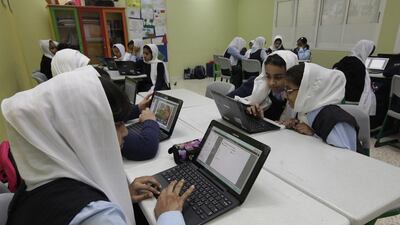Whether a Gulf youth grows up to be the next Larry Page or not, programming is a highly useful skill. One of the top challenges holding back the Arab digital ecosystem is the need for more Arab knowledge creators.
Over 450 million people speak Arabic (7 per cent of the world), but only 3 per cent of the world’s internet content is in Arabic. We have researched high-tech ecosystems around the world extensively and know that human capital is the beating heart of a knowledge-based economy. Simply put, if Arab youth are not represented in tech, their ideas, concerns and designs won’t be included when the next decade’s cities, cars, infrastructure, medicine and communications are built.
The problem is that TV and pop culture often depict coding as sitting in a dark room in front of a small screen running complex formulas, perpetuating the stereotype that it’s too difficult, too technical, or only a hobby for nerds. But these generalisations miss the point: Apple, Google and Microsoft were all founded in garages and people’s homes, not tech-savvy R&D centres. And coding can be a lot easier and more fun than people think. It is just a set of instructions to tell your computer what to do; it’s almost like a recipe.
Education and coding lie at the very core of Google’s mission to organise the world's information and make it universally accessible and useful. Many of our engineers were exposed to coding early on in their lives. In fact, 98 per cent of Google’s engineers started learning computer science before college. We have hired engineers from across the Arab world, from Cairo to the Gulf. Many of our core staff are non-American. Why can’t coding be for Arab youth too, to catapult tomorrow’s innovators from the Arab world?
Abu Dhabi, for instance, is already taking steps to ignite the interest of youth in coding skills . The capital is rolling out Google’s coding skills programme, Computer Science First, to over 250,000 students – most with no background in coding at all.
We’ve seen a 40 per cent jump in students who stated “I can create things with computer science” with a 13 per cent increase in the number of students who said, “If I get stuck on a computer science problem, I know how I might solve it”. This autumn alone, 7,000 students in Abu Dhabi enrolled in CS First.
We’ve seen how coding can bring computer science to life. The cult classic Hackers, starring Angelina Jolie, went viral in Silicon Valley in the 1990s. The film follows high school students who hack their way to the truth and was a microcosm of how coding became “cool” in the US. Youth in global capitals now want to become part of the club. We want to offer a few insights from the front lines of the computing revolution:
Programmers are key in so many parts of ours lives. They analyse big data sets rapidly, making it vastly easier to predict earthquake patterns and translate languages fast so people globally can understand each other. Computer science has led to a surprising number of everyday inventions.
Combining computer science with movies led to the blockbuster movie Avatar. Combining it with a wristband led to tech that measures your daily physical fitness. Combining coding with a camera led to Instagram. Coding opens up a diverse set of jobs and hobbies.
Coding skills can enable individuals’ skills, expanding Arab youth employment in careers from aeronautics to zoology. These are all information fields.
Programming skills could mean opportunities for upward mobility and a way for Arab youth to pivot from being consumers of technology, to co-creators of it.
And we know to accelerate the scale of the Arab digital ecosystem, the engine is education, with emphases on computational thinking and coding skills.
The Arab world could catalyse the next generation of content creators – two-thirds of whom are under 30 – through computer science.
Coding careers have become the coin of the digital realm. Developing a tech-savvy workforce is key to alleviating the Gulf’s heavy dependence on foreigners as well. Coding skills can help catalyse the next big leap in education.
Computer programmers are already busy revolutionising nearly every aspect of the global economy. They are a motley crew of creativity and wild ideas and who are turbocharging globalisation. We think Arab youth can be part of this. It will be amazing if the next Apple, Facebook or Google was founded in the Middle East.
Sam Blatteis is Google’s lead for government relations and public policy in the GCC

